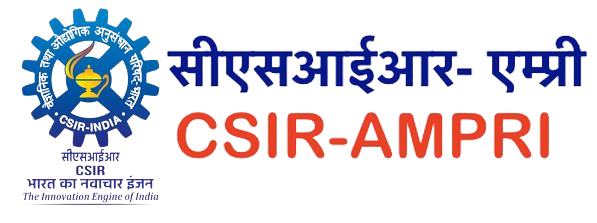VISIT OF Dr. GIRISH SAHNI, DG, CSIR AND SECRETARY, DSIR, GOVT. of INDIA
Dr. Girish Sahni, Director General (DG), CSIR and Secretary, DSIR, Govt. of India visited CSIR-AMPRI Bhopal on June 11, 2016. Dr. B.K. Mishra Director CSIR-IMMT, Bhubaneswar, Dr. K. Muraleedharan Director CSIR-CGCRI, Kolkata, Dr. Rakesh Kumar Director CSIR-NEERI, Nagpur, Dr. P. K. Singh Director, CSIR-CIMFR, Dhanbad, Dr. N. Gopalakrishna Director, CSIR-CBRI, Roorkee, and Dr. Raj Hirwani, Head –CSIR Unit for Research & Development of Information Products, Pune were also present on the day of DG’s visit. Other dignitaries who were present on that day included Dr. B. Singh, Chief Scientist CSIR-CBRI, Roorkee and Dr. Debanik Roy, Scientist & Chief Programme Officer, BRNS, DAE, Mumbai .
The purpose of the visit of these dignitaries was to get apprised of various Research and Development (R & D) activities being carried out at CSIR –AMPRI, Bhopal along with detailed discussion on Mission Mode Project on Innovative and Intelligent Materials.
To appraise DG of the different R&D activities being carried out at the Institute, a display related to the research output/products/technologies developed by the scientists was made. DG and other Directors praised the efforts made and success achieved at CSIR-AMPRI in spite of the limited numbers of Scientists here. The R&D activities displayed included efforts of AMPRI in the areas of (i) Radiation shielding and cement free concrete material (ii) utilization of sea water sand sea-sand and fly ash for making cement free concrete (iii) utilization of Copper mine tailing from Malanchkhand for making value added materials (iv) development of advanced cost effective flexible and moldable EMI shielding materials (v) development of non-toxic lead free radiation shielding material for simultaneous shielding of X-ray and gamma rays for nuclear power plants (vi) development of cement free concrete material useful for road applications (vii) development of non-toxic lead free radiation shielding material for cost effective geo polymeric coating in mild steel substrate (viii) development of Smart and Functional material (ix) Light weight Metallic materials including composites and foams (x) Hybrid composites (xi) water filter based on Nano Adsorbent .
DG directed all present to make it a point that beneficiaries should be asked to acknowledge the R&D contributions of CSIR on each occasion to indirectly put a stamp mark on the efforts of researchers/scientists by tagging it worthwhile, useful and trustworthy. “Acknowledgement by beneficiaries is the biggest recommendation for CSIR” he added.
DG-CSIR, Dr. Sahni laid the foundation stone of ‘Centre for Advanced Radiation Shielding Materials’ at CSIR-AMPRI, Bhopal in the presence of Dr. Debanik Roy, Chief Co-ordinator of BRNS, Mumbai. The development of advanced radiation shielding material is among the thrust area of CSIR-AMPRI and the developed non-toxic lead free shielding material has been accredited by Atomic Energy Regulatory Board (AERB), Mumbai for construction of diagnostic X- ray rooms in India. Meanwhile, CSIR-AMPRI, Bhopal and DST, New Delhi are sponsoring this centre for upscaling of the process for making Advanced Non–toxic X-ray, gamma rays and neutron radiations useful for broad application spectrum ranging from moldable and flexible simultaneously shielding EMI and X-ray radiation shielding to simultaneously shielding gamma neutron radiation in various matrices namely ceramic, concrete and polymeric matrices useful for nuclear power plants and other strategic sectors.
In his address to the staff, DG-CSIR, emphatically stressed on need-based research in CSIR and inspired young researchers to explore more possibilities in the R&D world, especially by making optimum usage of technology, under seniors’ guidance. He said, “Integration of technology is a must while we conduct various projects as it is the fastest and best mode to reach out at global level, not just national.” However, he showed concern regarding ‘microscopic visibility’ of CSIR brand, in spite of commendable R&D. He suggested improving terms and conditions in the external projects as well as in technology transfers by Institutions.
